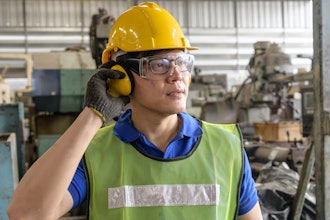
KANSAS CITY, Mo. - A suspended simultaneous sandwich assay (SSSA) is the breakthrough in food safety and quality testing the industry has been waiting for, and it fits in the palm of your hand. Alden combines the power of innovation with the "internet of things" to deliver a new pathway for ensuring food safety, quality, and compliance.
Safeguarding meat and poultry products for consumers is time sensitive. Traditional testing modalities take several days to produce results. Alden – a multinational, Missouri-based biotechnology company – recognized the need for a faster, simpler testing method. They will showcase their company's next-generation diagnostic testing solutions at the Annual Meeting of the International Association for Food Processing (IAFP) July 14-17 in Long Beach, Calif.
While polymerase chain reaction (PCR) testing is currently the most commonly used method for detecting the presence of pathogens like E. coli, the innovators at Alden have created a novel, bead-based testing method that functions differently – and is just the beginning of a new gold industry standard for microbe testing in food. Third-party laboratory studies deem the Alden platform to work "as well as or better" than PCR.
The AOAC Research Institute Performance Tested MethodsSM (PTM) Program recently certified Alden's S1 for E. coli O157 testing method for E. coli O157 (including H7) detection in ground beef (375 g and 25 g) and beef trim (375 g) (PTM #042401). Comparing the SSSA approach to the USDA/FSIS Microbiology Laboratory Guidebook (5C.03) and the ISO Technical Standard 13136:2012 PCR reference methods, the PTM program found "no statistically significant difference from the reference methods."
Those are welcomed results for meat processors and consumers who face the consequences of undetected outbreaks. Several additional microbe tests are on track for PTM validation in the coming months, including Listeria, Salmonella, Campylobacter, and others.
Unlike legacy testing systems such as PCR, enzyme-linked immunosorbent assay (ELISA), and lateral flow testing, Alden is safest for use within a production environment because personnel, product, and equipment have zero risk of being exposed to potentially harmful control pathogens.
Alden's use of SSSA technology involves a small sample volume being placed into the cuvette containing the SSSA. What follows is a new scientific approach using nanoparticles, proprietary coatings, and custom ratios to simultaneously capture and detect targeted bacteria, resulting in a visible change.
Alden's innovative technology is available via offsite laboratory testing and Alden's affordable and highly portable onsite testing solution. Either way, customers have access to an online platform that digitizes results and provides much-needed transparency into every step of the testing workflow.






















